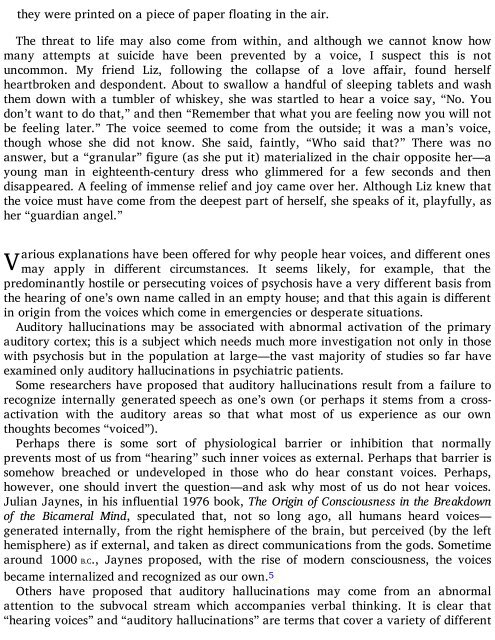32896589326509350
You also want an ePaper? Increase the reach of your titles
YUMPU automatically turns print PDFs into web optimized ePapers that Google loves.
they were printed on a piece of paper floating in the air.<br />
The threat to life may also come from within, and although we cannot know how<br />
many attempts at suicide have been prevented by a voice, I suspect this is not<br />
uncommon. My friend Liz, following the collapse of a love aair, found herself<br />
heartbroken and despondent. About to swallow a handful of sleeping tablets and wash<br />
them down with a tumbler of whiskey, she was startled to hear a voice say, “No. You<br />
don’t want to do that,” and then “Remember that what you are feeling now you will not<br />
be feeling later.” The voice seemed to come from the outside; it was a man’s voice,<br />
though whose she did not know. She said, faintly, “Who said that?” There was no<br />
answer, but a “granular” gure (as she put it) materialized in the chair opposite her—a<br />
young man in eighteenth-century dress who glimmered for a few seconds and then<br />
disappeared. A feeling of immense relief and joy came over her. Although Liz knew that<br />
the voice must have come from the deepest part of herself, she speaks of it, playfully, as<br />
her “guardian angel.”<br />
V<br />
arious explanations have been oered for why people hear voices, and dierent ones<br />
may apply in dierent circumstances. It seems likely, for example, that the<br />
predominantly hostile or persecuting voices of psychosis have a very different basis from<br />
the hearing of one’s own name called in an empty house; and that this again is dierent<br />
in origin from the voices which come in emergencies or desperate situations.<br />
Auditory hallucinations may be associated with abnormal activation of the primary<br />
auditory cortex; this is a subject which needs much more investigation not only in those<br />
with psychosis but in the population at large—the vast majority of studies so far have<br />
examined only auditory hallucinations in psychiatric patients.<br />
Some researchers have proposed that auditory hallucinations result from a failure to<br />
recognize internally generated speech as one’s own (or perhaps it stems from a crossactivation<br />
with the auditory areas so that what most of us experience as our own<br />
thoughts becomes “voiced”).<br />
Perhaps there is some sort of physiological barrier or inhibition that normally<br />
prevents most of us from “hearing” such inner voices as external. Perhaps that barrier is<br />
somehow breached or undeveloped in those who do hear constant voices. Perhaps,<br />
however, one should invert the question—and ask why most of us do not hear voices.<br />
Julian Jaynes, in his inuential 1976 book, The Origin of Consciousness in the Breakdown<br />
of the Bicameral Mind, speculated that, not so long ago, all humans heard voices—<br />
generated internally, from the right hemisphere of the brain, but perceived (by the left<br />
hemisphere) as if external, and taken as direct communications from the gods. Sometime<br />
around 1000 B.C., Jaynes proposed, with the rise of modern consciousness, the voices<br />
became internalized and recognized as our own. 5<br />
Others have proposed that auditory hallucinations may come from an abnormal<br />
attention to the subvocal stream which accompanies verbal thinking. It is clear that<br />
“hearing voices” and “auditory hallucinations” are terms that cover a variety of different

















